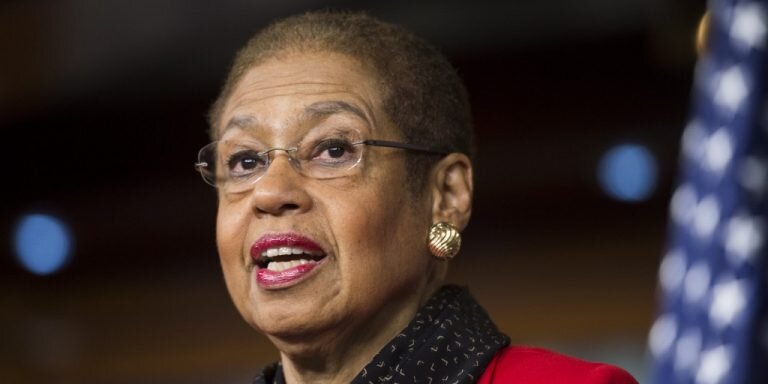Image taken from ABC News
“No taxation without representation.” A phrase that every American history textbook holds that fuels Americans’ pride in the founding fathers, that represents the groundwork of the “American dream.”
You may be surprised that 714,153 Americans are taxed without representation. How is this possible? The answer is simple: Washington D.C. is not a state. Why isn’t D.C. a state? The answer to that question is complicated and is currently inspiring a heated debate in Congress.
Current Situation
Currently, Congress is debating whether or not to establish Washington D.C. as the 51st state in America. Representative Eleanor Holmes Norton, Washington D.C.’s non-voting representative in Congress, drafted the bill that would grant D.C. statehood. The state would be known as the Douglass Commonwealth in honor of Fredrick Douglass. Rep. Norton’s bill would give Washington D.C. residents voting rights and provide D.C. with one voting House representative and two Senators.
Washington D.C. According to the Founders
In 1790, the federal government took territory from Virginia and Maryland to create the federal capital. Washington D.C. had only about 3,000 residents, which was considered too small of a population to warrant it a state. Moreover, most of the white men in D.C. still owned property in Virginia or Maryland, so they could still vote. Similarly, members of Congress registered to vote in their home state.
Civil Rights to the Home Rule Act
Washington D.C. went through a series of changes during the Reconstruction Era and the Civil Rights Movement. During Reconstruction, approximately one-third of D.C. residents were Black, and Black men also entered local office. In the 1870s, the city lost its local representation because white Congressmen were concerned about the number of Black men in D.C. who could run for office. And, similar to 1790, Congressmen were registered in their home states and continued to vote.
In 1957, Washington D.C. became the first majority-Black city in the U.S. The 23rd Amendment, which granted three electoral votes for presidential elections, passed in 1961. Ten years later, Congress granted D.C. a non-voting representative in the House. Finally, a century after the city lost its local government, the 1973 Home Rule Act gave D.C. residents the right to elect a city mayor.
Previous Attempts for Statehood and Potential Change
Representative Norton raised the idea of Washington D.C. statehood in 1993, but the bill failed in the House. Come 2020, a new bill to grant D.C. statehood passed the House, but former Senate Majority Leader Mitch McConnel refused to bring the bill to a vote. In the current attempt to establish the 51st state, Norton is hopeful that the bill will pass. However, while the bill is likely to pass in the House, the Senate is an unlikely victory, given that D.C. is primarily Democratic.
The bill outlines a section of the city for the new federal capital with a two-mile radius. It includes the White House, Capitol, Supreme Court, National Mall, and monuments. The Washington D.C. Government would undergo many changes. First, Congress would no longer have control over D.C.’s laws, budget, and court system. Second, the mayor would become the governor, and the district council would become a state legislature. Third, D.C. could call on the national guard in an emergency without the federal government’s approval. This change is especially relevant because the National Guard could have come to prevent the capital riots on January 6th earlier if Mayor Muriel Bowser had the power to call them herself.
Arguments for and Against Statehood
Local officials are determined to get statehood under the pretense of civil rights. Beverley Perry, the senior advisor to Mayor Bowser, explained that Washington D.C. residents were being disenfranchised, which is an issue that the founders did not anticipate. Perry argues that D.C. still does not have statehood because of its significant Black population.
Moreover, the government taxes Washington D.C. residents without their representation. While Washington D.C. is geographically small, the district has more residents than Vermont and Wyoming, so population density is no longer a relevant argument against statehood. D.C. Residents are in strong support of statehood and are holding rallies by the capital.
However, it is essential to acknowledge the valid argument against statehood. The Constitution says,
“The Congress shall have Power To… exercise exclusive Legislation in all Cases whatsoever, over such District (not exceeding ten Miles square) as may, by Cession of particular States, and the Acceptance of Congress, become the Seat of the Government of the United States…” (The U.S. Constitution, Article I, Section 8, Clause 17)
Referencing this clause, many Republicans argue that the only way Washington D.C. could become a state is through a Constitutional amendment. They also explain that the Founding Fathers would not want a D.C. to become a state, as the federal capital would become significantly smaller.
Although politicians on both sides have solid arguments, it is no coincidence that D.C. statehood is a partisan issue. Because the city is primarily Democratic, statehood would almost certainly result in two Democratic senators, tipping the Senate even further into a democratic majority. If the situation was reversed, there is reason to believe that democrats and republicans would switch their positions.
So what is this issue really about? Civil rights? Representation? The Constitution? It depends on who you ask, but as of now, Washington D.C. statehood remains in the hands of Congresspeople as they make a potentially historic decision for 714,153 Americans.

